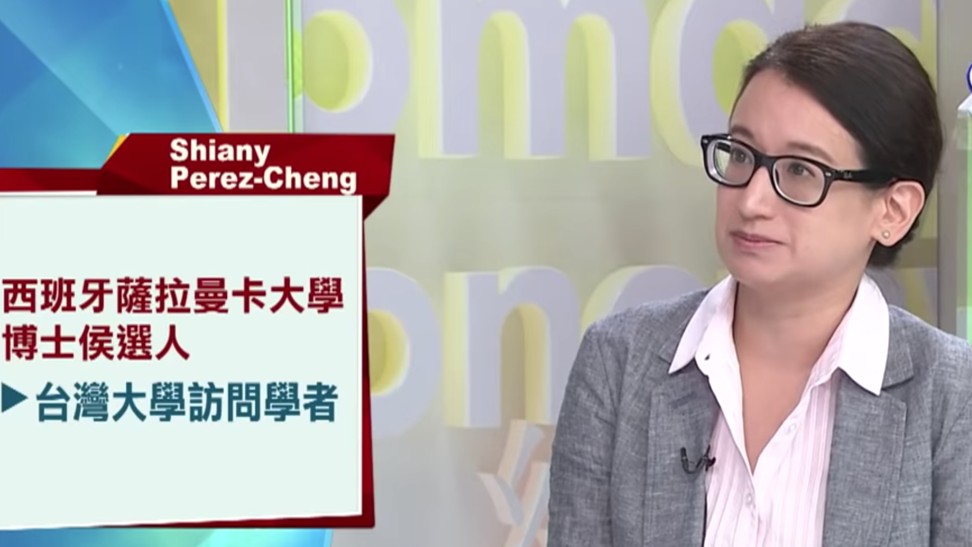
Beijing accused of pressuring Spanish university to drop Taiwanese cultural event
Academic releases emails said to be from Chinese embassy in Spain telling college’s social sciences dean to cancel the plan to avoid ‘unpleasant incident’
A Taiwanese academic has accused Beijing of pressuring a prestigious Spanish university to axe a cultural event for the island last year through its embassy in Spain, alleging that Madrid directed the college to cancel the plan.
The University of Salamanca, sometimes referred to as the “Oxford of Spain”, dropped two days of programming for the event in October, after the Chinese embassy in Spain demanded it be cancelled, according to Shiany Perez-Cheng, who taught at the university from 2008 to 2017.
“Taiwan Cultural Days” had been organised by a group at the university and was scheduled to run over three days, on October 19, 25 and 26.
Taiwan’s former president Chen Shui-bian calls for island to vote on whether it wants to be part of China
Inspired by other scholars researching Beijing’s influence operations, Perez-Cheng published emails last week showing the embassy’s education affairs office had ordered the university’s social sciences dean José Manuel del Barrio to cancel the cultural event to avoid an “unpleasant incident” that would impact the college’s relationship with mainland China.

Beijing considers the self-ruled island of Taiwan a breakaway province, and has objected to any indications otherwise.
“We wouldn’t like your institution to be used by Taiwanese authorities as a platform for their political propaganda, it would affect the university’s good relations with China,” the embassy’s email, dated October 23, reportedly said, in a veiled threat that referenced the many mainland Chinese scholars and students at the university.
The embassy is said to have taken issue with the Taiwanese representative to Spain, Simon Ko Shen-yeaw, being invited to speak at the event’s inauguration on October 19, saying it “causes confusion and misunderstandings about the Taiwan problem”.
Taiwanese engineers lured to mainland China as chip makers go into overdrive
Perez-Cheng said the dean’s office forwarded the embassy’s email to the Taiwan studies area of the East Asian studies master’s programme, which organised the event, and called for a meeting that day.
“When we got to the college of social science, the mood was rather sombre,” she told the South China Morning Post. “They were really scared, the ‘Oh my God, we have angered China, Beijing’s going to retaliate’ kind of scared.”
During the meeting, del Barrio said the university had contacted the Spanish central government about the incident, and that “instructions on how to deal with the incident came from Madrid”, according to Perez-Cheng. On the afternoon of October 24, the dean announced in an email that the Taiwanese cultural event had been cancelled “due to circumstances not related to the School of Social Sciences”.
Should Taiwan be worried if it loses all its allies?
Officials from the University of Salamanca and the Spanish government did not respond to requests for comment. The Chinese embassy in Spain asked for emailed questions, which were not answered.
In response to faxed queries, China’s Ministry of Foreign Affairs said it was not familiar with the situation, but emphasised that the “one China” principle was an important prerequisite for all countries that have diplomatic ties with Beijing, including Spain.
“China does not object to countries it has diplomatic ties with having normal economic or people-to-people exchanges with Taiwan, but resolutely opposes those countries having any form of governmental exchange with Taiwan,” a ministry spokesperson said.
The incident comes as Beijing has increasingly sought to limit Taiwan’s space in the international arena. In recent months, Beijing has ordered airlines, hotels and retailers to refer to Taiwan as part of China, with many businesses complying to avoid losing access to the large mainland Chinese market.
After Perez-Cheng went public with the incident, Taiwan’s foreign ministry said on Twitter that Beijing was “suppressing Taiwan culture and academic freedom in a sovereign and democratic state far from its shores”.

